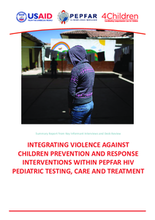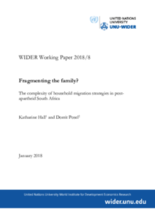childrens_living_arrangement
children_living_without_bio
Displaying 171 - 180 of 336
This study explored the perceptions of experts and guardians regarding the early onset of misbehaviour in male, at-risk children in child and youth care centres in South Africa.
The paper articulates accomplishments of child and youth care centres in providing care and support to children identified to be at risk of significant harm in Soweto, South Africa.
This paper focuses on how the Family Assessment for Least Developed Countries (FA-LDC) instrument can be used as evidenced-based practice to assist social workers in statutory investigations.
This research provides insight into the current intervention strategies used by social workers in emergency child protection, whereby children are removed from their caregivers as a result of abuse and are placed at child and youth care centres.
This paper from the journal of Social Work/Maatskaplike Werk discusses the experiences of parents receiving family reunification services because their children have been placed in child and youth care centres in South Africa.
This study aims to develop a model for practice for implementing emergency child protection interventions with children at risk.
This brief reference surveys the national policy of three representative African countries on the legal guardianship of children who are without parents or families.
This report presents the preliminary findings from an ongoing project undertaken by 4Children that seeks to identify key opportunities to incorporate violence prevention and response interventions within priority PEPFAR Program Areas at clinical and community levels.
This article examines the care experiences of former looked‐after children from a residential care setting in South Africa.
In this mixed methods study, the authors use nationally representative panel data to investigate migration patterns when viewed from the perspective of children.





